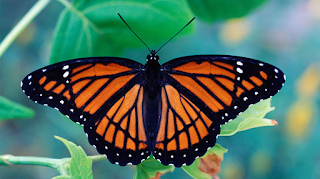How do organisms develop and organised themselves?

Biology is a world of great symmetry. Pleasing to the eye and of spectacular beauty. Some examples include butterflies, others that are less beautiful may include crayfish and ones that are of great curiosity include yourself. The exceptional symmetry of a butterfly But, biology is also approximate and so there are slight unintended modifications - mistakes. I must stress, these mistakes (often genetic mutations) are not always bad. Some mutations may cause cancer , some may be of benefit and and some may do nothing at all. But how do you understand organisation when it has small random inaccuracies? Scientists are studying the incredible developmental coordination and organisation phenomena that our cells, tissues and organs undergo. Fate Mapping is a method used to study the organisation of cells - typically the embryonic stages of life. 42 years ago an enzyme from the roots of horseradishes was isolated and proved to be an effective marker to study cell progeny. It wa...